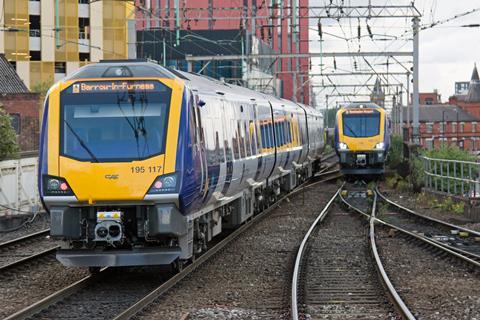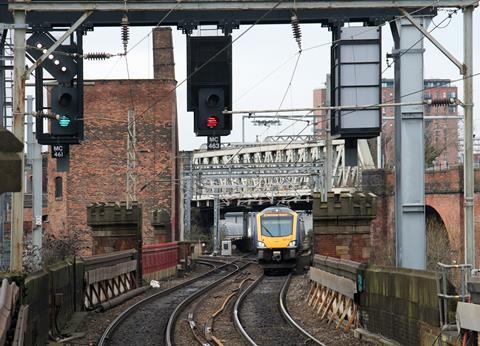
UK: Local authorities have confirmed that the preferred option for timetable changes to improve performance in the north of England and provide a short-term solution to congestion in central Manchester will not be accepted ‘unless the government fully commits to delivering key rail investment projects in the north, leading to increased capacity and connectivity’.
At a meeting of Transport for the North’s Rail North Committee on July 14, members accepted that work should continue on drafting the December 2022 timetable, given the long lead times involved. However, they expressed concern that slow progress with infrastructure enhancements such as new signalling, trackwork and platform lengthening meant there was no certainty over how long the ‘stripped-back’ timetables would need to be in place.
The issues centre around congestion in the Castlefield corridor, which forms a key part of the network which normally carries more than 116 000 passengers per day into Manchester, a 72% increase since 2002. The east-west routes also carry more than 7 000 passengers/day to and from Manchester Airport.
The committee expressed concern that there was no holistic plan for rail upgrades in the region, nor any firm commitment to delivering in full major projects such as the Transpennine Route Upgrade, High Speed 2 and Northern Powerhouse Rail. The members felt that a clear programme was needed, ‘with strong leadership and accountability’ rather than the current ‘siloed project-by-project nature’ of rail enhancements.
‘The north of England is being asked to accept a reduced rail timetable because of the failure to prioritise our rail network for the investment it desperately needs’, said Mayor of Greater Manchester Andy Burnham. ‘This is unacceptable to me and many other mayors and leaders across the north. We can’t keep making decisions that impact on communities without a commitment to deliver the infrastructure. We need the government to give a clear timetable for work to solve rail congestion in central Manchester.’

Option B+ takes shape
Whilst previous aspirations had envisaged a new timetable structure being introduced from May 2022, this has now been delayed until December. Building on consultation responses which showed that the three proposed options — which involved increasing levels of intervention — were not deliverable, the Manchester Recovery Task Force has created Option B+, which retains an all-day service from Southport and Wigan to Manchester Oxford Road.
This would reduce the number of trains passing through the Castlefield corridor by 15% and provide regular interval services for the majority of routes. However, further work is needed to develop options for Liverpool – Warrington – Oxford Road services with the aim of restoring cross-Warrington connectivity. MRTF notes that this may require a trade-off with stopping patterns.
According to the task force, ‘Option B+ delivers significant passenger benefits’. Whilst 95% of passengers would be unaffected, the recommended changes are estimated to save 100 000 min per day based on reduced delays, equivalent to 1 h per month for a regular commuter ‘compared with the performance offered by the December 2019 timetable’.
Adopting the principle of ‘fewer but longer trains’, the task force recommends that in many cases the service structure should be based on six-car trains. However, this would require further station enhancements and additional rolling stock. The committee was told that the alternative to endorsing Option B+ ‘would result in the continuation of the Covid timetables’, with changes to meet demand only being considered if they ‘did not have a significant impact on performance levels’.
Conditional acceptance
The committee resolved that it would ‘reluctantly’ accept the proposed timetable changes for December 2022, but only when the government provides a response on the following points:
- the Integrated Rail Plan to be published before the end of July must detail what rail projects will be funded and when they will be delivered;
- an initial package of infrastructure schemes in Manchester needs to start earlier than currently planned;
- these schemes must enable long-held commitments for new connections, including services from Bradford and the Calder Valley to Manchester Piccadilly and Manchester Airport;
- there must be a firm commitment to reinstate direct services between South Yorkshire and Manchester Airport, if these are removed in December 2022, along with a timescale for their reinstatement;
- there must be a satisfactory resolution of the detailed Cheshire and cross-Warrington service pattern during the next phase of timetable development.
TfN has written publicly to ministers setting out these conditions. The committee has requested a quick response and plans to meet again before the end of July to consider its next steps.
‘Losing the direct rail link between South Yorkshire and Manchester Airport is a retrograde step that would leave Sheffield one of the only cities in the world without a direct train to a major international airport’, said Dan Jarvis, Mayor of the Sheffield City Region. ‘I’ve been clear since these discussions started that I would never support a move which would have such a negative impact on my region.’
Infrastructure roadmap
TfN has been working with MRTF to develop a roadmap for future service development, which links investment in infrastructure to services. This aims to identify solutions to issues raised in the responses that will not be addressed directly by the December 2022 timetable changes.
‘The fact we are being asked to make these choices shows the rail network is at bursting point’, explained Mayor of West Yorkshire Tracy Brabin. ‘This is why we need commitments to Transpennine Route Upgrade, Northern Powerhouse Rail, including a new line between Manchester and Leeds with a stop at Bradford Central, as well as HS2, to create the breathing space needed to improve services for all users.’
| TfN roadmap for infrastructure and service development | |
|---|---|
|
2022 |
a reliable base timetable |
|
2022 |
introduction of more Class 323 EMUs to permit phased six car operation |
|
2023 |
start of procurement of new rolling stock to replace 1980s diesel trains |
|
2022 – mid 2020s |
first wave of large infrastructure improvements, subject to business case: Airport station, additional station platforms, city centre station passenger environment improvements |
|
mid 2020s onwards |
Castlefield Corridor resignalling enabling service changes. More electrification to bring performance and capacity improvements |
|
Late 2020s – early 2030s |
Major infrastructure improvements aligned to HS2 and NPR: South Manchester new signalling, potential junction remodelling around Piccadilly and Ordsall. |



